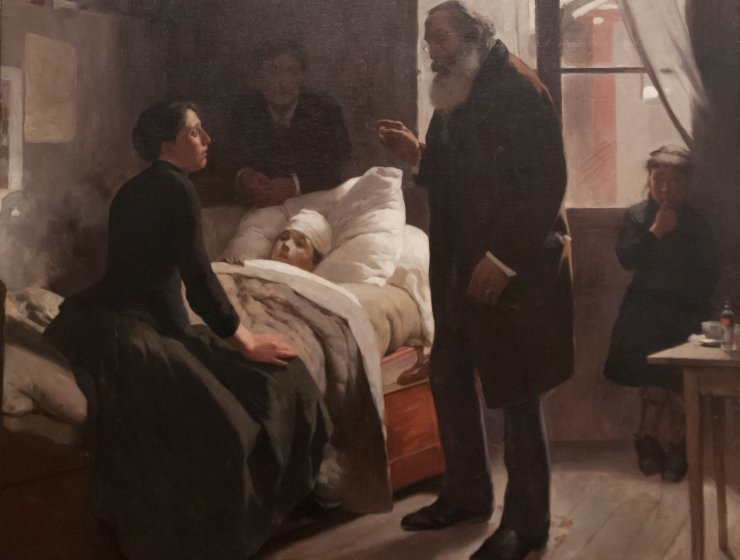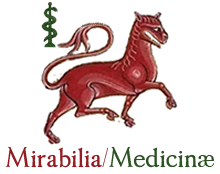
-Index-
Editorial: III Seminar UNESC of Medical Humanities / I Seminar UFES of Medical Humanities
Helio ANGOTTI NETO
Original title: Editorial: III Seminário UNESC de Humanidades Médicas / I Seminário UFES de Humanidades Médicas
This edition of Mirabilia Medicinae brings articles from the III Seminar UNESC of Medical Humanities / I Seminar UFES of Medical Humanities, and from the I Seminar UFES of Paleopathology.
Medieval leprosy and the metaphorical medicine of Ramon Llull (1232-1316)
Ricardo da COSTA; Hélio ANGOTTI-NETO
Original title: Medieval leprosy and the metaphorical medicine of Ramon Llull (1232-1316)
A brief study of leprosy in the Middle Ages, its history, medical perception and social attitude toward manifestations of the disease. As a case study about the prevailing medical principles, we present some excerpts from Començaments de Medicina (c.1274-1283), Doctrina pueril (c. 1274-1276), Fèlix o Libre de Maravelles (1288-1289), and Liber prouerbiorum (c. 1296) by the medieval philosopher Ramon Llull (1232-1316). It presents the theoretical foundations of his Medicine: a metaphorical art that links the Hippocratic four elements (air, fire, earth and water) and Christian Theology using numeric symbolism.
Have we learned from the mistakes of the past? Segregation of leprosy patients until the twentieth century
Patrícia Duarte DEPS, Brunella de A. FREITAS, Cícero D. CHICON, Larissa C. CASER, Líbia A. MENDES, Marianna M. SIQUEIRA, Luciana QUINTELA, Manoel A. CATARINA
Original title: Será que aprendemos com os erros do passado? Segregação dos pacientes portadores de hanseníase até o século XX
Hansen’s disease, also known as "leprosy" in Brazil until the end of the 60s in the last century, is an infectious disease of low contagiousness. Once the cause was unknown, in Medieval Age, leprosy was a disease related to divine punishment, and leprosy patients were stigmatized and isolated in "leper colonies". The suffering of those who were diagnosed with leprosy lingers to nowadays, and the current article brings events that occurred with carriers of the disease in Brazil until 1979 mainly. In the State of Espírito Santo was built Dr. Pedro Fontes Hospital, also known as Colony of Itanhenga, which was opened in 1937. That Colony Hospital worked for several decades as a place of compulsory isolation of leprosy patients. We show the vision of former leprosy patients and former staffs of Dr. Pedro Fontes Hospital, and former inmates of Alzira Bley Educational Establishment, a site dedicated to the segregation of children born from leprosy patients while hospitalized at Dr. Pedro Fontes Hospital. The article presents the theme to bring up the reflection about decisions made by the society that hurts the basic principles of human rights.
Human dignity and conflicts of interest in clinical trials in the book "The Constant Gardener"
Márcia de Cássia CASSIMIRO, Joana ARAÚJO, Teresa Adão da FONSECA
Original title: Dignidade humana e conflitos de interesse nos ensaios clínicos na obra O Fiel Jardineiro
The cruel and violent history of humanity, full of injustices and tyrannies revealing indifference and disrespect for human dignity, has nevertheless shown real progress in understanding and recognising each person's dignity and in establishing such dignity as the foundation for the rights and ethical imperatives with which human society has been built. Nowadays, however, human progress in the fields of medicine, biotechnology and scientific research entails unacceptable abuse and heralds serious threats to human dignity. Objectively, loss of dignity can occur in situations of war, poverty, or social misery, but people in these situations can still preserve great dignity in their behaviour, not feeling unworthy in the eyes of others. There are situations of great indignity. The issue in The Constant Gardener involves a clear violation of dignity. The way the pharmaceutical industry, lacking any scientific integrity, conducts a clinical trial in a country who’s political and social situation is completely disrupted and where the population is highly vulnerable due to several factors such as their economic and social condition, food shortages, and high illiteracy is without a doubt a clear violation of human dignity. Conflicts of interest in scientific research, particularly in clinical trials and how they are conducted, represent a point of convergence of two different areas, science and ethics, encouraging reflection and the search for solutions that will promote not only scientific, but also moral progress.
The contribution of Ernesto Salles Cunha for paleopathology in the State of Espirito Santo, Brazil
Henrique Antônio VALADARES COSTA, Patrícia D. DEPS
Original title: A contribuição de Ernesto Salles Cunha para a paleopatologia no Estado do Espírito Santo, Brasil
Ernesto de M. Salles Cunha (1907-1977) was Professor of Dentistry School at the Universidade Federal Fluminense and set his life as an enthusiast of the Brazilian history of health, more precisely about the history of dental health and the development of archeology in Brazil. This article demonstrates the importance of the researcher presence in the Capixaba`s territory contributing with the studies about the dental paleopathology of the Sambaquis population in the State of Espirito Santo.
The abortion of useless life: the life between secularization and the sacred
Euler Renato WESTPHAL
Original title: O aborto de vida inútil: a vida entre a secularização e o sagrado
This article approached the utilitarian ethic view about the human dignity. According to utilitarianism, the human life does not have dignity and it does not have worth by itself. The infanticide could be a possibility to free the parents of children who have any handicaps. Human life only has value if there is self-consciousness and a life project. From that moment on, the genetic improvement would also be justified by the PGD (Preimplantation Genetic Diagnosis) so that children would not get serious diseases. Which are the limits between eugenics and therapy, among utility and human dignity? Alberto Giubilini, Francesca Minerva, Peter Singer, Hannah Arendt, Jürgen Habermas, Joachim Jeremias, Oscar Cullmann were partners of discussion in this article. It is remarked that the human dignity, the universal rights of human being are heritages of the Judeo-Christian theology. God unconditionally loves the sinner, the patient, the weak and the excluded. From that moment on, the Christian theology indicates to the solidarity of God to those who are considered, by the liberal eugenic, “not worth living”. The critical dialogue among bioethics and theology has the aim of seeking criteria so that the human life will not be instrumentalized by interests of human designers.


















































































